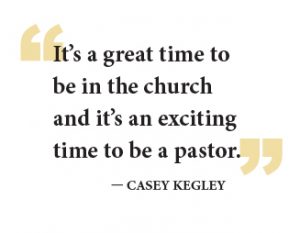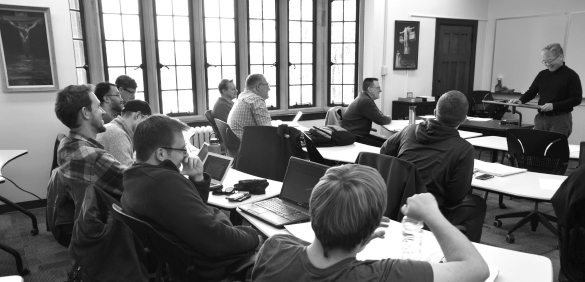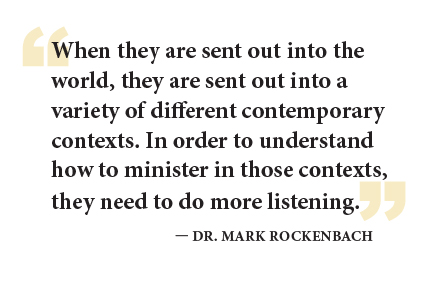
Concordia Seminary Newsroom
Preparing Pastors for Today's World

By Jackie Parker
During a recent class this winter, first-year students were reminded how the posts they make on social media can have a positive — or negative — effect on a person’s view or understanding of Christianity and the church. Tweets and Facebook status updates carry immense weight in today’s world.
“Every interaction you have is a witness to an outsider,” the professor said. The students nodded in approval, taking in the weight of his words.
The class, Pastoral Ministry 101, introduces students to the Office of Public Ministry. But the class reaches far beyond the pulpit, covering topics like social media, finances, hospitality and alcohol use. It is just one example of the multifaceted approach Concordia
Seminary, St. Louis takes to prepare students to share the Gospel in an increasingly anti-church world.
The Seminary aims to equip students with the theological and practical knowledge they need to be prepared to meet the challenges they will face as pastors.
“At the end of the day, people out in the world are crying out for belonging and community. They’re crying out for meaning and purpose in life. They’re crying out for balance and rest in a restless world,” said Dr. Leopoldo A. Sánchez M., associate professor of systematic theology and the Werner R.H. Krause & Elizabeth Ringger Krause Professor of Hispanic Ministries. “Students at Concordia Seminary are formed to tell the Christian story that addresses and answers all these cries and to do so in faithful but also winsome and persuasive ways. Even in a world that is hostile, people are looking for a story that provides hope and purpose.”
 Dr. Mark Rockenbach teaches Pastoral Ministry and emphasizes to his students that the most important skill a pastor can have is the ability to listen.
Dr. Mark Rockenbach teaches Pastoral Ministry and emphasizes to his students that the most important skill a pastor can have is the ability to listen.
“We listen, so that we don’t miss the many opportunities to care for broken hearts with the joy and peace of the Gospel,” said Rockenbach, an associate professor of practical theology and adviser of personal growth and leadership development.
“No one can effectively proclaim the Gospel without first listening,” he said. “Foremost, those serving in ministry must listen to the Word of God. The joy and peace of the Gospel needs to impact their hearts before they can be sent out to care for the hearts of others. But when they are sent out into the world, they are sent out into a variety of different contemporary contexts. In order to understand how to minister in those contexts, they need to do more listening.”
Throughout a student’s ministerial formation process, the Seminary’s faculty shares the current situation of post-Christendom with students, said Dr. Joel Okamoto, associate professor of systematic theology and the Waldemar and Mary Griesbach Professor of Systematic Theology. He said there is a need for a systematic approach to theology because “you can’t assume people understand God,” he said. “We have to have answers.”
Casey Kegley, a fourth-year Master of Divinity student, believes that even with a decline in church attendance and other challenges facing the church, “It’s a great time to be in the church and it’s an exciting time to be a pastor,” he said.
Kegley said in Okamoto’s World Religion class, the professor explained how religion is a narrative, or an account of the way things are, and whether people know it or not, it offers a true reality.
 “Christianity can open doors and start conversations,” Kegley said. “Dr. Okamoto encouraged us to hear and to listen with interest to what others have to say.” But reaching others with the hope of the Gospel goes beyond just listening, he said.
“Christianity can open doors and start conversations,” Kegley said. “Dr. Okamoto encouraged us to hear and to listen with interest to what others have to say.” But reaching others with the hope of the Gospel goes beyond just listening, he said.
“I feel like more and more what’s required for us is to live a life so different and compelling that others wonder at it,” Kegley said. “If we take seriously what Jesus says, we should look like a pretty strange people who produce curiosity and wonder in others.”
Students are encouraged to engage with the culture in their communities and neighborhoods both now and in the future, after they are called as pastors.
“We want to prepare students to be able to engage with people outside the church and with different cultures and be comfortable doing that,” Okamoto said. “This is our situation today. We are no longer in a predominant Christian culture.”
Kegley recalled being a student in Rockenbach’s classroom and how the professor discussed the courage it takes for people to open their lives to pastors.
“When they pour out their hearts to you, you should not take a hammer and smash that heart but validate what they’ve done and give them the truth of the Gospel in a gentle way,” he said. “I’m not out to win arguments. I’m just going to give people what I believe because God has done some pretty cool stuff in my life and I can tell them that He has done that for them as well.”
Understanding the contextual heart of each person means you need to be a good listener, Rockenbach said. Church workers should listen to God’s Word first; then, listen to the people around them.
“They need to listen to the hearts of people who struggle everyday with being sinful creatures and living in a fallen world. And in that listening, the pastor or deaconess begins to understand the specific concern that needs to be attended to,” he said. “This listening is important because you don’t care for people in the same way. How you care for someone who is grieving is different from how you care for someone struggling with identity issues.

In Dr. Joel Okamoto’s Christian Apologetics class, students discuss the definition of apologetics: a rational explanation and defense of Christian faith and life. Photo: Jackie Parker
“How you care for someone who is dying is different from how you care for someone who is celebrating the birth of his or her first child. How you care for someone who is a lifelong Christian is different from how you care for someone who doubts there is a gracious God.”
While serving his vicarage at a church in Tennessee, Kegley asked 15 people to church each week. What appeared to be a simple conversation with a stranger often ended with a new visitor to church.
Now as a concluding student at Concordia Seminary, Kegley said he often asks himself, “Are people going to see evidence of Jesus in me?”
Looking ahead to Call Day and his first placement into ministry, he said he hopes to equip the people he shepherds to show and share the Gospel with their family, friends and colleagues. “Sometimes when an accountant or car salesman shares his or her faith, it can come through louder and clearer than when the same message comes from a pastor,” Kegley said.

Even so, Kegley said he feels prepared to reach out to all kinds of people, including those with serious questions and doubts about Christianity.
“At some point, we all have had doubts,” Kegley said. “There are things God does that confuse and frustrate us, so I think it is important to help people see it is OK to have questions. We must encourage them to go back to Scripture and to the cross, to the places where God finds us. God has His own timing. The important thing is to encourage those conversations even when it feels like the questions have been answered.
“Each of us is a finished work yet still in progress,” he said. “The work is never done, but in a sense, it’s complete because of what Jesus did.”